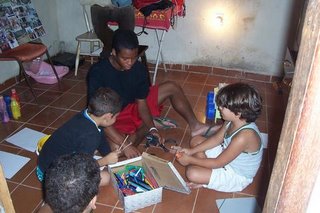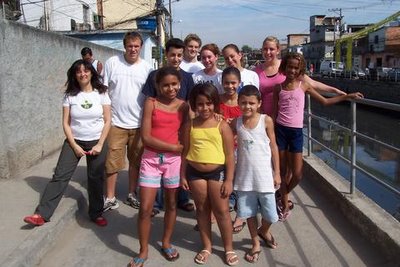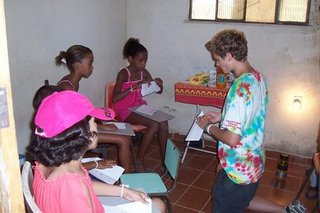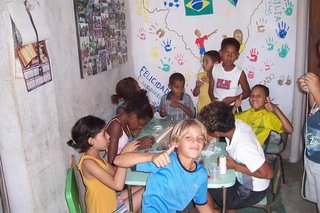Rafael Posts: Visiting Parada de Lucas

Rafael Rivero, CatComm's International Outreach Intern this Summer '06, reflects on his visit to a Rio shantytown:
"I’ve always been a little afraid of kids. Being the youngest of seven children, I’ve rarely had the chance to interact with those younger than myself. Though I am only 19, I often feel estranged from the young children I encounter while at home in the U.S. I am dumbfounded by the effortless manner with which they lug around their portable PlayStations, the way they man their iPods with one hand while typing a text message on their cell phone with the other, the way they drag their parents to Toys’r’Us to get all things related to the latest Japanese cartoon fad—and other symptoms of the untamed consumerism that is so highly cherished in the 'developed' world.
That world felt light years away last Monday when I visited Parada de Lucas, a poverty-stricken slum in Rio de Janeiro with about 8,000 inhabitants. My destination was A Look Into Other Things, a unique community initiative founded by CatComm regular Neuza Nascimiento.
 The educational fieldtrips organized by her organization are a regular activity for children in the community. There is a desperate need for constructive entertainment for the community’s children, which often complain of having 'nothing to do' in a place where youth entertainment is limited to the infamous 'bailes funk,' rowdy street parties where drugs, sex, and vulgar music combine to create an atmosphere that is harmful to the younger kids. Recently, Neuza has solidified her organization, opening CIACAC’s permanent headquarters and establishing a daycare 'school' that the neighborhood children can attend before and after school.
The educational fieldtrips organized by her organization are a regular activity for children in the community. There is a desperate need for constructive entertainment for the community’s children, which often complain of having 'nothing to do' in a place where youth entertainment is limited to the infamous 'bailes funk,' rowdy street parties where drugs, sex, and vulgar music combine to create an atmosphere that is harmful to the younger kids. Recently, Neuza has solidified her organization, opening CIACAC’s permanent headquarters and establishing a daycare 'school' that the neighborhood children can attend before and after school. My official job was to act as a translator for Neuza and 5 high-school-aged volunteers from the Denver-based Odyssey Group. They were there to teach leadership skills to neighborhood children through didactic, value-based activities.

We all got there by train from Rio’s central station. The first thing I noticed was that, unlike the trains that run through the city’s affluent Southern section, the North-bound—and slum-bound—train we were on had no white people on it. This was a disquieting reminder that, even though much is made about Brazil’s racially inclusive society, racism is still very much alive in Brazil, even if it is masked by the more obvious class discrimination.
 The slum, while lacking the most basic elements of infrastructure, had a charmingly chaotic feel to it. At the new CIACAC headquarters, I clumsily translated for Neuza and the American volunteers as we set off to a nearby school to collect chairs, tables, and educational materials. Upon returning, we set about cleaning what we’d collected and setting up the space for the next day’s classes. As we worked, I noticed that neighborhood kids had begun popping their heads in, curiously watching the foreign-looking strangers. After a while, I drifted away from my group and went towards the children. I asked them their names. Some hesitated. Others simply giggled at my rudimentary Portuguese. To my surprise, 3 out of the 4 children had English names, like Patrick and Kelly.
The slum, while lacking the most basic elements of infrastructure, had a charmingly chaotic feel to it. At the new CIACAC headquarters, I clumsily translated for Neuza and the American volunteers as we set off to a nearby school to collect chairs, tables, and educational materials. Upon returning, we set about cleaning what we’d collected and setting up the space for the next day’s classes. As we worked, I noticed that neighborhood kids had begun popping their heads in, curiously watching the foreign-looking strangers. After a while, I drifted away from my group and went towards the children. I asked them their names. Some hesitated. Others simply giggled at my rudimentary Portuguese. To my surprise, 3 out of the 4 children had English names, like Patrick and Kelly.But those were just their real names, they told me. In Parada de Lucas, 'we use nicknames.' That’s how I got to know Meatball, Twiggy, Big-Ears, and Smelly. Even in the slums, it seems, kids are not without a sense of humor.
 We immediately hit it off. I spent the rest of the day amusing and being amused by my new friends. They took turns as I gave them piggyback rides through a rackety bridge that crossed the most trash-filled canal I’ve ever seen. They showed me their humble homes. They squealed with glee when I told them they could each choose one small candy from the corner store. They shrieked in horror as I swallowed my own tongue for them, and sighed with relief when I brought it back from the depths of my throat (Note: Yeah, I really can do that.) Don’t try that at home, I warned them.
We immediately hit it off. I spent the rest of the day amusing and being amused by my new friends. They took turns as I gave them piggyback rides through a rackety bridge that crossed the most trash-filled canal I’ve ever seen. They showed me their humble homes. They squealed with glee when I told them they could each choose one small candy from the corner store. They shrieked in horror as I swallowed my own tongue for them, and sighed with relief when I brought it back from the depths of my throat (Note: Yeah, I really can do that.) Don’t try that at home, I warned them.I left with a promise that I’d return three days later. It struck me that it had probably been a long time since an 'adult' had paid so much attention to them.
I’ve returned once already and I intend to return many more times before I go home. The kid’s delightful innocence has shown me just how important Neuza’s work is, as it allows them a respite from the turbulent world they inhabit. I am glad to be contributing to CatComm, an organization from which CIACAC has greatly benefited, attracting the volunteers that developed and fundraised for the new headquarters, facilitating CIACAC's receipt of its first grant that allowed it to gain official status, and making it possible for CIACAC to open a bank account. And most recently connecting CIACAC with these two-week internships by American teens from the Odyssey Institute. I’ll return to Miami with a newfound appreciation for children as well as for the value of social work."


<< Home